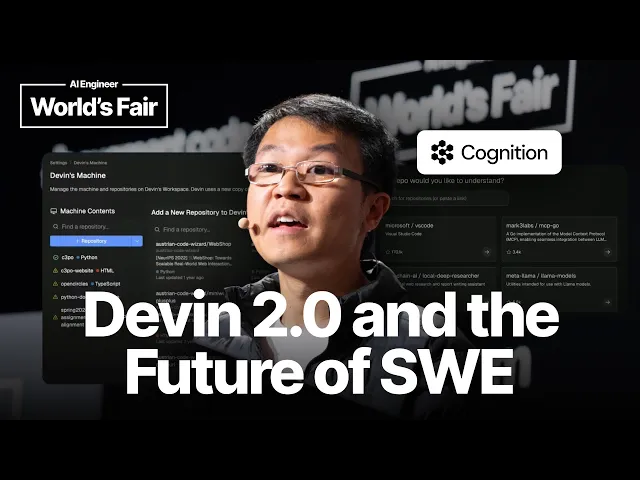Devin 2.0 and the Future of SWE

Devin 2.0: redefining the developer experience
In the rapidly evolving landscape of AI development tools, Cognition's Devin 2.0 represents a significant leap forward in autonomous coding assistants. The recent presentation by Scott Wu outlines how this tool is not just enhancing developer productivity but fundamentally reimagining the software engineering workflow. As AI continues to transform professional work across industries, Devin stands out as a compelling example of how these technologies can augment rather than replace human expertise.
Key Insights from Devin 2.0's Development
-
Collaborative workflow integration – Rather than positioning Devin as a replacement for human developers, Cognition has designed it to function as a collaborative partner that handles repetitive tasks while enabling engineers to focus on higher-level problem-solving and architectural decisions.
-
Memory and reasoning improvements – Devin 2.0 features significant upgrades to its memory systems, allowing it to maintain context across complex, multi-file projects and make more sophisticated reasoning chains when tackling complex engineering problems.
-
Autonomous iteration capabilities – One of the most impressive advancements is Devin's ability to self-correct through testing, debugging, and refining its code—creating a feedback loop that mirrors experienced developers' problem-solving approaches.
The Paradigm Shift in Developer Augmentation
What makes Devin 2.0 particularly noteworthy is its approach to augmenting developer capabilities rather than automating them away. This represents a crucial evolution in how we think about AI tools in professional contexts. Rather than positioning AI as a replacement for software engineers, Cognition has created a system that handles the labor-intensive aspects of coding while elevating the human role to that of an architect and decision-maker.
This approach aligns with broader industry trends where the most successful AI implementations complement human expertise rather than attempting to supplant it. In software development specifically, this means tools that can handle boilerplate code generation, test writing, and debugging while developers focus on system design, user experience, and business logic decisions that require contextual understanding.
Beyond the Demo: Real-World Applications and Limitations
While Devin's capabilities are impressive, it's worth examining how such tools perform in production environments beyond controlled demos. Several major tech companies have begun integ
Recent Videos
How To Earn MONEY With Images (No Bullsh*t)
Smart earnings from your image collection In today's digital economy, passive income streams have become increasingly accessible to creators with various skill sets. A recent YouTube video cuts through the hype to explore legitimate ways photographers, designers, and even casual smartphone users can monetize their image collections. The strategies outlined don't rely on unrealistic promises or complicated schemes—instead, they focus on established marketplaces with proven revenue potential for image creators. Key Points Stock photography platforms like Shutterstock, Adobe Stock, and Getty Images remain viable income sources when you understand their specific requirements and optimize your submissions accordingly. Specialized marketplaces focusing...
Oct 3, 2025New SHAPE SHIFTING AI Robot Is Freaking People Out
Liquid robots will change everything In the quiet labs of Carnegie Mellon University, scientists have created something that feels plucked from science fiction—a magnetic slime robot that can transform between liquid and solid states, slipping through tight spaces before reassembling on the other side. This technology, showcased in a recent YouTube video, represents a significant leap beyond traditional robotics into a realm where machines mimic not just animal movements, but their fundamental physical properties. While the internet might be buzzing with dystopian concerns about "shape-shifting terminators," the reality offers far more promising applications that could revolutionize medicine, rescue operations, and...
Oct 3, 2025How To Do Homeless AI Tiktok Trend (Tiktok Homeless AI Tutorial)
AI homeless trend raises ethical concerns In an era where social media trends evolve faster than we can comprehend them, TikTok's "homeless AI" trend has sparked both creative engagement and serious ethical questions. The trend, which involves using AI to transform ordinary photos into images depicting homelessness, has rapidly gained traction across the platform, with creators eagerly jumping on board to showcase their digital transformations. While the technical process is relatively straightforward, the implications of digitally "becoming homeless" for entertainment deserve careful consideration. The video tutorial provides a step-by-step guide on creating these AI-generated images, explaining how users can transform...
